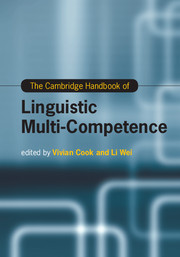

TYLER, ANDREA and ORTEGA, LOURDES 2016. Usage-based approaches to language and language learning: an introduction to the special issue. Language and Cognition, Vol. 8, Issue. 3, p. 335.
2016. A Transdisciplinary Framework for SLA in a Multilingual World. The Modern Language Journal, Vol. 100, Issue. S1, p. 19.
Gass, Susan 2016. The path I took. Language Teaching, Vol. 49, Issue. 4, p. 578.Brown, Amanda and Ruiz, Heather 2016. Equity and enrichment in the TESOL practicum. ELT Journal, p. ccw092.
Piccardo, Enrica 2017. Plurilingualism as a Catalyst for Creativity in Superdiverse Societies: A Systemic Analysis. Frontiers in Psychology, Vol. 8, Issue. ,
Ó MURCHADHA, NOEL and FLYNN, COLIN J. 2018. Educators’ Target Language Varieties for Language Learners: Orientation Toward ‘Native’ and ‘Nonnative’ Norms in a Minority Language Context. The Modern Language Journal, Vol. 102, Issue. 4, p. 797.
Wei, Li 2018. Translanguaging as a Practical Theory of Language. Applied Linguistics, Vol. 39, Issue. 1, p. 9.
Gass, Susan 2018. Coda 1 World Englishes and Second Language Acquisition: Working towards a common goal. World Englishes, Vol. 37, Issue. 1, p. 120.
Wei, Li and (Jenifer) Ho, Wing Yee 2018. Language LearningSans Frontiers: A Translanguaging View. Annual Review of Applied Linguistics, Vol. 38, Issue. , p. 33.
Singleton, David and Pfenninger, Simone E. 2018. L2 acquisition in childhood, adulthood and old age. Journal of Second Language Studies, Vol. 1, Issue. 2, p. 254.
Gross, Barbara and Dewaele, Jean-Marc 2018. The relation between multilingualism and basic human values among primary school children in South Tyrol. International Journal of Multilingualism, Vol. 15, Issue. 1, p. 35.
De Houwer, Annick and Ortega, Lourdes 2018. The Cambridge Handbook of Bilingualism.Ortega, Lourdes 2018. Ontologies of language, Second Language Acquisition, and world Englishes. World Englishes, Vol. 37, Issue. 1, p. 64.
Putnam, Michael T. Carlson, Matthew and Reitter, David 2018. Integrated, Not Isolated: Defining Typological Proximity in an Integrated Multilingual Architecture. Frontiers in Psychology, Vol. 8, Issue. ,
Barratt, Leslie 2018. The TESOL Encyclopedia of English Language Teaching. p. 1.CARLSON, MATTHEW T. 2019. Now you hear it, now you don't: Malleable illusory vowel effects in Spanish–English bilinguals. Bilingualism: Language and Cognition, Vol. 22, Issue. 5, p. 1101.
Thompson, Amy S. 2019. The Palgrave Handbook of Motivation for Language Learning. p. 641.Vettorel, Paola 2019. Communication strategies and co-construction of meaning in ELF: Drawing on “Multilingual Resource Pools”. Journal of English as a Lingua Franca, Vol. 8, Issue. 2, p. 179.
Wildsmith-Cromarty, Rosemary and Balfour, Robert J. 2019. Language learning and teaching in South African primary schools. Language Teaching, Vol. 52, Issue. 3, p. 296.
Iwasaki, Noriko and Kumagai, Yuri 2019. Reconceptualizing Connections between Language, Literacy and Learning. Vol. 39, Issue. , p. 165.
Edited by Vivian Cook , University of Newcastle upon Tyne , Li Wei , Institute of Education, University College London
Publisher: Cambridge University Press Online publication date: May 2016 Print publication year: 2016 Online ISBN: 9781107425965 Collection: Cambridge Handbooks of Linguistics Digital access for individuals (PDF download and/or read online) Added to cart Digital access for individuals (PDF download and/or read online)How are two or more languages learned and contained in the same mind or the same community? This handbook presents an up-to-date view of the concept of multi-competence, exploring the research questions it has generated and the methods that have been used to investigate it. The book brings together psychologists, sociolinguists, Second Language Acquisition (SLA) researchers, and language teachers from across the world to look at how multi-competence relates to their own areas of study. This comprehensive, state-of-the-art exploration of multi-competence research and ideas offers a powerful critique of the values and methods of classical SLA research, and an exciting preview of the future implications of multi-competence for research and thinking about language. It is an essential reference for all those concerned with language learning, language use and language teaching.
‘… a true tour de force. Its broad scope, covering everything from methodology to learning and teaching and representing a variety of original approaches to traditional language learning research, makes it a must read for anyone interested in what it means to know more than one language.’
Susan M. Gass - Distinguished University Professor, Michigan State University
‘… constitutes a major landmark that will help shift assumptions away from thinking of monolingualism as the norm to accepting multilingualism as the default condition for human language ability. The chapters are written by top scholars in all aspects of the language sciences, producing a collection that is compulsory reading for researchers, educators, and clinicians.'
Ellen Bialystok - Distinguished Research Professor of Psychology, York University, Toronto
'… wonderfully rich in its state-of-the-art delineation of linguistic multi-competence approaches to study of individuals and communities previously known as merely 'bilingual'. From translanguaging to creativity in language use, language acquisition to attrition, syntax to emotion and personality, the range of the topics (and the authors) reflects the broad extension Cook's concept of multi-competence has achieved. I plan to use this book regularly in the neurolinguistics classes I teach on bilingualism.’
Loraine K. Obler - Distinguished Professor, City University of New York Graduate Center
‘Vivian Cook's inspiring notion of multi-competence has sown seeds in many different areas of language research and this collection that Li Wei and he have put together provides ample proof of that. This should rapidly become standard reading for all these interested in enlightened approaches to language use and language users, monolinguals and multilinguals alike.’
Mike Sharwood Smith - Emeritus Professor of Languages, Heriot-Watt University, Edinburgh and Honorary Professorial Fellow, University of Edinburgh